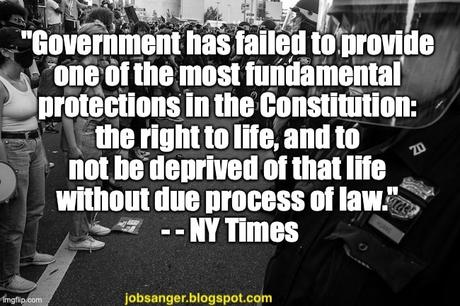
We have a problem here in the United States. It is a problem of police violence -- especially against African-Americans. It's not a new problem. It's been with us for a long time, and it's caused by our continuing problem with racism -- especially in our societal institutions like law enforcement.
Donald Trump and his racist followers don't see a problem. That doesn't mean't it doesn't exist -- just that it's going to be even harder to solve. But solve it we must, because our Constitution guarantees all citizens (not just white citizens) the protection of the rule of law.
The following is part of an excellent editorial from the editorial board of The New York Times. They have some suggestions as to how we can begin to solve this serious problem.
Last week it was George Floyd, who died while restrained by a police officer in the middle of a Minneapolis street in daylight, though he posed no physical threat. His alleged offense? Passing a counterfeit bill to buy a pack of cigarettes. Before him it was Breonna Taylor, an emergency room technician in Louisville, Ky., shot dead in her own apartment by officers who used a battering ram to burst through her front door.
Before Ms. Taylor it was Laquan McDonald. And Eric Garner. And Michael Brown. And Sandra Bland. And Tamir Rice. And Walter Scott. And Alton Sterling. And Philando Castile. And Botham Jean. And Amadou Diallo.
The list goes on and on, and on and on. Black Americans brutalized or killed by law enforcement officers, who rarely if ever face consequences for their actions. Derek Chauvin, the officer accused of kneeling on Mr. Floyd’s neck until he was dead, had 18 prior complaints filed against him.
In the name of all these men and women and countless more, this is why thousands of Americans have taken to the streets — to express a rage born of despair. Despair that their government has failed to provide one of the most fundamental protections in the Constitution: the right to life, and to not be deprived of that life without due process of law. Stop killing us. . . .
Here are some steps to move the country toward a place where citizens don’t live in fear of those charged with serving and protecting them:
USE-OF-FORCE POLICIES
In departments with policies that sharply limit when, where and how police officers may use force, shootings and killings by the police are much lower. For instance, police officers should be required to try de-escalation before resorting to the use of force. They should not be allowed to choke people. Officers should be required to stop other officers from using excessive force.
TRANSPARENCY
When the police do use deadly force, the public should be able to know about it. That means getting rid of provisions like Section 50-a of New York’s civil rights law, which prevents the release of police personnel and disciplinary records and allows bad officers to continue abusing their power with impunity.
ACCOUNTABILITY
Police officers enjoy a web of protections against the consequences of their behavior on the job. From the legal doctrine of qualified immunity to state and local police indemnification laws, it is nearly impossible for a plaintiff to get any justice, even when an officer unquestionably violated his or her rights.
UNION CONTRACTS
Across the country, powerful police unions negotiate favorable contracts that shield the police from investigation and discourage citizens from bringing complaints. The contracts make it easier to hire, and harder to fire, officers with documented histories of bad behavior. Cities are under no obligation to agree to these terms, and they shouldn’t.
LEVERAGE FEDERAL FUNDING
Following the beating of Rodney King and the Los Angeles riots in 1992, Congress empowered the Justice Department to oversee local police departments. That led to scores of investigations and long-overdue reforms in places like Baltimore and Ferguson, Mo. But the federal government also has other tools. It can deny grants to police departments that fail to impose strict use-of-force policies or refuse to discipline officers who engage in misconduct.
DEMILITARIZATION
When you have a grenade launcher, even peaceful protesters look like enemy combatants. It’s no surprise that as police departments have stocked up on military-grade equipment, they have acted more aggressively. The Obama administration restricted the flow of certain types of equipment, but President Trump lifted those restrictions in 2017.

